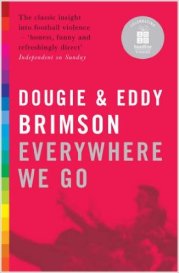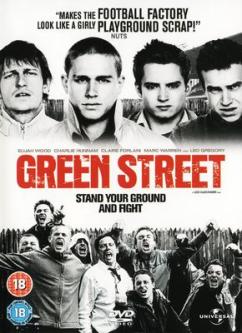
Photo Alexey Shlyk
In 1996, Dougie and Eddy Brimson wrote a groundbreaking, insider’s account of British football violence. 20 years on, Everywhere We Go remains an era-defining, bestselling book. Dougie has since written another 14 titles, both fiction and non-fiction, as well as 4 films including the huge hit Green Street, starring Elijah Wood. With another hectic year ahead of him, Dougie was kind enough to pause and answer our questions on his amazing career so far.
1. How did your first book Everywhere We Go come about? Did a publisher approach you to write it or did you write it and then look for a publisher?
The short version is that during the build up to Euro 96, my brother and I realised that there was a gap in the market for a book which countered some of the rubbish that was being spouted in the media about the culture of hooliganism. But we also realised that if we were going to be the ones to fill that gap, we would have to write something which would capture the interest of both sides of the debate.
So we began to jot down some thoughts and when we had about 10,000 words we simply picked a publisher at random and sent them a sample to see what they thought of the idea. That publisher was Headline, they loved it and Everywhere We Go was published in early ’96. It really was that simple.

2. Your first books were landmark, non-fiction accounts of British football violence. What was the hardest part about writing about the world you knew? And how much danger did these books put you in?
Well that’s very nice of you to say! The truth is that we actually found them quite easy to put together because they are, in essence, our opinions on various issues surrounding the culture of fandom peppered with anecdotes obtained from people we knew or who contacted us. The reason they worked so well is that not only were our opinions pretty much on the same wavelength as many of the people involved in the so-called Saturday scene, but because they were written in a style that was very easy to read.
However, we always knew that we were going to upset people along the way and that proved to be the case. There was certainly a price on our heads at one point but if you’re going to put anything in print, you have to be prepared to back it up and we were.
3. In 2001 you published The Crew, your first of many novels. Football violence was still at the heart but how did you find the switch from non-fiction to fiction?
Well it helped that I had the incentive of developing a basic plot outline for the writer Lynda La Plante who wanted to use football hooligans in one of her TV series. However, once I was up and running, I actually found it extremely easy.
Of course by this time, I had a good handle on my readership and so had a fairly reasonable idea of what they wanted to read and just as importantly, how they wanted to read it. After all, unless they’re on holiday the average bloke generally reads in bed, on trains or in the loo. So I always write in 15 minute chunks which ironically, made things easier with fiction than non-fiction. The hard bit was persuading my publisher to take it on although they were pretty good in the end.

4. Wings of a Sparrow was more football fiction but this time you replaced grit and violence with comedy and dreams. Was it fun writing something a little lighter?
Oh absolutely. One of the main reasons we go to football is because essentially, it’s a lot of fun and after years of writing about the darker side of it, I wanted to write something which made not only me, but the readers laugh about the daftness of local rivalries.
I’d actually written some comedy stuff before, first with The Geezers Guide to Football and then Billy’s Log but Wings is targeted much more directly at the sport and the reasons why we love it. After all, it’s essentially based on one of those questions which fans around the world have bandied about since the birth of the game. Wings really was a joy to write and I hope that comes across on the page.

5. Football fiction isn’t a genre with a particularly strong literary reputation. Why do you think that is and do you think it’s unjustified? How would you describe your audience?
That’s a great question and in all honesty, it’s a genuine mystery to me. Maybe you should ask some publishers!
Personally, I think that there is no single answer, just a lot of different factors. It’s certainly true that mainstream publishers are afraid to take any risks these days and it’s also safe to say that football as a subject matter is a huge turn off for those commissioning editors who handle fiction and there seems to be two reasons for that. First, despite its success in non-fiction, the game is still regarded very much as ‘down market’ by the fictional side of the publishing fence and secondly, football books are generally targeted at a male readership and since ‘Lad-Lit’ as a genre doesn’t really exist, even if a writer came up with a marketable storyline, where would it sit?
Ironically, the market is certainly there and it’s gagging for stuff. Fever Pitch still sells strongly decades after its initial publication whilst my first novel, The Crew, has sat at number one on the Amazon football download chart for over four years! Even the sequel Top Dog still sells well and I’m always being asked for more.
That said, I think I’m fairly odd in that I write very much for my market as opposed to the market if that makes sense. I always keep in mind that the most important person in the publishing game is the reader and so have always tried to give my lot what they want as opposed to what I think they might like. Thus far, thank goodness, it seems to be working!
6. You’re perhaps best known for writing Green Street, the big football hooliganism film starring Elijah Wood. How was that to work on? What differences did you find between screenwriting and book writing?
Screenwriting is a very different writing discipline and it’s one which has its good and bad points. For a start, it’s very much a collaboration which is great if you’re working with good people, not so great if you’re working with idiots. Equally, with books a writer is in control of pretty much everything whereas in film, it’s out of your hands pretty much from the moment you hand over the first draft of a script.

7. What’s your favourite football book (fiction or non-fiction) and why?
I’m a big fan of Left Foot Forward by Garry Nelson because I think it captures the life of an average footballer pretty much perfectly and it’s also brilliantly written. The Tales from the Vicarage series by Lionel Bernie are also pretty awesome reads but that’s because I’m a Watford fan!
8. And finally, what does 2016 have in store for your busy self?
I’m currently writing In The Know which is the third novel in the The Crew, Top Dog trilogy and I’m also working on two films. One about the war in Afghanistan and the other, a screen adaptation of Wings of a Sparrow which is proving to be great fun. Aside from that, Watford are keeping me pretty occupied at the moment. Long may that continue!
For more info on past and present projects, visit http://www.dougiebrimson.com/
Pingback: The process of writing: Motivation. | A Write Old Life.
Reblogged this on A write old life. .
LikeLike
Pingback: Pitch & Page: Dougie Brimson interview | A Write Old Life.